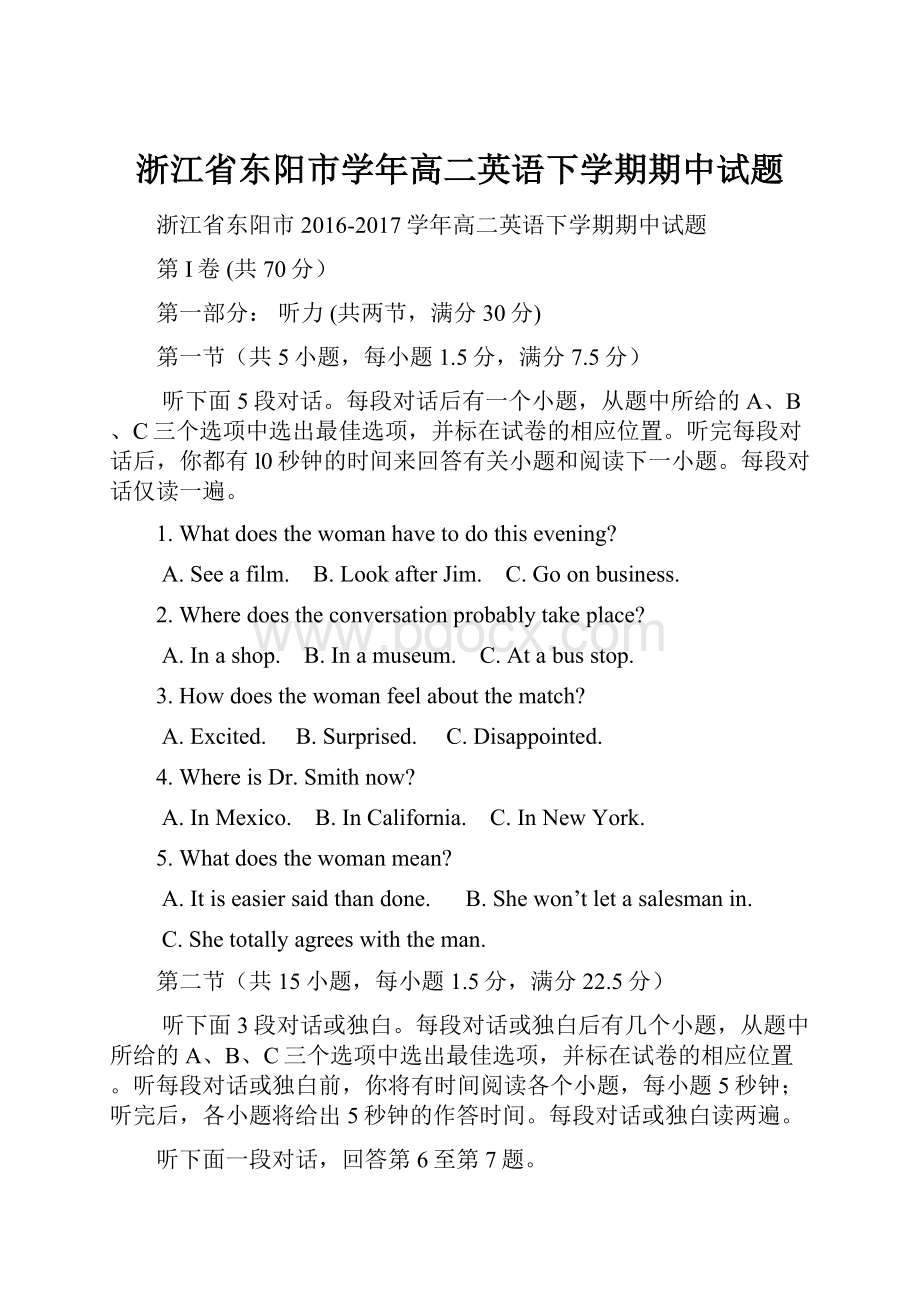浙江省东阳市学年高二英语下学期期中试题.docx
《浙江省东阳市学年高二英语下学期期中试题.docx》由会员分享,可在线阅读,更多相关《浙江省东阳市学年高二英语下学期期中试题.docx(16页珍藏版)》请在冰豆网上搜索。

浙江省东阳市学年高二英语下学期期中试题
浙江省东阳市2016-2017学年高二英语下学期期中试题
第I卷(共70分)
第一部分:
听力(共两节,满分30分)
第一节(共5小题,每小题1.5分,满分7.5分)
听下面5段对话。
每段对话后有一个小题,从题中所给的A、B、C三个选项中选出最佳选项,并标在试卷的相应位置。
听完每段对话后,你都有l0秒钟的时间来回答有关小题和阅读下一小题。
每段对话仅读一遍。
1.Whatdoesthewomanhavetodothisevening?
A.Seeafilm.B.LookafterJim.C.Goonbusiness.
2.Wheredoestheconversationprobablytakeplace?
A.Inashop.B.Inamuseum.C.Atabusstop.
3.Howdoesthewomanfeelaboutthematch?
A.Excited.B.Surprised.C.Disappointed.
4.WhereisDr.Smithnow?
A.InMexico.B.InCalifornia.C.InNewYork.
5.Whatdoesthewomanmean?
A.Itiseasiersaidthandone.B.Shewon’tletasalesmanin.
C.Shetotallyagreeswiththeman.
第二节(共15小题,每小题1.5分,满分22.5分)
听下面3段对话或独白。
每段对话或独白后有几个小题,从题中所给的A、B、C三个选项中选出最佳选项,并标在试卷的相应位置。
听每段对话或独白前,你将有时间阅读各个小题,每小题5秒钟;听完后,各小题将给出5秒钟的作答时间。
每段对话或独白读两遍。
听下面一段对话,回答第6至第7题。
6.Whathavethespeakersleftbehind?
A.Thecups.B.Theplates.C.Thefryingpan.
7.Whatarethespeakersdoing?
A.Shopping.B.Camping.C.Cooking.
听下面一段对话,回答第8至第10题。
8.Whatarethespeakerstalkingabout?
A.Howtodoapart-timejob.B.HowtostudyEnglishwell.C.Howtogetsomemoney.
9.Whatistheprobablerelationshipbetweenthespeakers?
A.Husbandandwife.B.Teacherandstudent.C.Bossandemployee.
10.Whatwillthemanprobablydonext?
A.Askthebossforaraise.B.Lookforjobinformation.C.TakeanotherEnglishcourse.
听下面一段对话,回答第11至第13题。
11.WhatwastheweatherlikeonMonday?
A.Good.B.Rainy.C.Windy.
12.WhatdidthemandoonTuesday?
A.Hewentshopping.B.Hewentupamountain.C.Hewenttosomemuseums.
13.WheredidthemangoonFriday?
A.Toabookstore.B.Toabeach.C.Toalake.
听下面一段对话,回答第14至第17题。
14.WhenwillthewomanprobablygotoYale?
A.OnAugust8th.B.OnAugust15th.C.OnAugust22nd.
15.Whatwillthewomandofirstbeforesheleaves?
A.Getavisa.B.Buyaplaneticket.C.Registerforclasses.
16.Whatdoesthewomanwanttomajorin?
A.EnglishLiterature.B.History.C.Maths.
17.Inwhichcountryshouldthestudentstakethebasiccourses?
A.France.B.America.C.Britain.
听下面一段独白,回答第18至第20题。
18.Whatmakesthecompetitionthisyeardifferentfromthepreviousones?
AThetypeofthefilmisfixed.B.Thetopicshouldbesomethingexciting.
C.Theremustbethreeactorsinthefilm.
19.Whoisinthejudgegroup?
A.Awriterandaplayer.B.Ahostandadirector.C.Anactorandafilm-maker.
20.Whatisthefirstprize?
A.Acamera.B.Asetofbooks.C.Avisittoafilmschool.
第二部分:
阅读理解(共两节,满分35分)
第一节(共10小题;每小题2.5分,满分25分)
A
Whenthemusicalsoundringsout,youimmediatelyreachforyourpocketreadytohaveachat.Butalthoughyouprobablyuseitallthetime,haveyoueverstoppedtothinkaboutthemannersrelatedtotalkingonthephone?
Ifyouhaven’t,herearesometipstoguideyou.
Alwaysgivethepersonyouarecallingplentyoftimetogettothephonebeforeyouhangup.Ifthepersonwhoanswersisnottheoneyouwant,giveyournameandaskifyoumayspeaktothepersonyouwant.
Thinkaboutthetimeyoucallpeople.Trynottocalltooearlyinthemorning(beforeabout9:
00)ortoolateatnight(afterabout9:
30).Alsotrynottocallatmealtimes.
IfyougobyplanetovisityourrelativesatChristmas,remembertofollowairlineinstructions.Cellphonesmustbeturnedoffassoonastheplanedoorsareclosedandremainsountilthedoorsopenagainonarrival.
Whenface-to-facewithsomeone,donottalkonthephone.Itisrudetobeonthephonewhenawaiteristryingtotakeyourorderinarestaurant,orwhenyouarereturningtheshoesyouhavejustbeentryingoninashop.
Finishanyface-to-facebusinessbeforetakingacall.Continuingtousethephonewhilenoddingtothepersoninfrontofyouisquiteimpolite.
Wheninarestaurantwithyourfriends,keepphoneconversationsshort.Makeacallonlyifitisimportant.Practicespeakinginalowvoice.Ifnoonelooksyourway,you’vegotit.
Ifyougotoatheatre,aconcertoracinema,considertheotherpeoplearoundyou.Checkthatyourphoneis“off”beforeyouenter.Ifyouareexpectingaveryimportantcall,putyourphoneon“vibrate”(振动)andrunfortheexitassoonasyoufeelit.Ifyouforgetboth“off”and“vibrate”andyourphonerings,don’tanswerit,turnitoffstraightaway.
21.Wemayinferfromthesetipsthat_____.
A.somepeopledon’tpaymuchattentiontomannerswhilemakingcellphonecalls
B.youmayasktoleaveamessageunlessthepersonyouarecallingisin
C.callingpeopletooearlyortoolateinthemorningisnotpolite
D.almosteveryonehasgotacellphone
22.Whatdoestheunderlinedsentence“…you’vegotit”meaninthepassage?
A.Youhavesucceededinmakingacallwithoutdisturbingothers.
B.Youhavemadethephonecallbriefandinteresting.
C.You’vegotthemessageyouarewaitingfor.
D.Youhavemadeaphonecallsecretly.
23.Fromthetipsgivenabove,wecandecidethewriterissuretosharetheopinionthat_____.
A.likethesaying“clothesmakeaman”,nowadayscellphonesmakeaman
B.astheoldsayinggoes,moneytalks;nowadayscellphonestalk
C.thewayweusethecellphonestellswhatwearelike
D.wearewhatcellphonesweuse
B
Badnewssells.Ifitbleeds,itleads.Nonewsisgoodnews,andgoodnewsisnonews.Thosearetheclassicrulesfortheeveningbroadcastsandthemorningpapers.Butnowthatinformationisbeingspreadandmonitoredindifferentways,researchersarediscoveringnewrules.Bytrackingpeople’se-mailsandonlineposts,scientistshavefoundthatgoodnewscanspreadfasterandfartherthandisastersandsobstories.
“The‘ifitbleeds’ruleworksformassmedia,”saysJonahBerger,ascholarattheUniversityofPennsylvania.“Theywantyoureyeballsanddon’tcarehowyou’refeeling.Butwhenyoushareastorywithyourfriends,youcarealotmorehowtheyreact.Youdon’twantthemtothinkofyouasaDebbieDowner.”
Researchersanalyzingword-of-mouthcommunication—e-mails,Webpostsandreviews,face-to-faceconversations—foundthatittendedtobemorepositivethannegative,butthatdidn’tnecessarilymeanpeoplepreferredpositivenews.Waspositivenewssharedmoreoftensimplybecausepeopleexperiencedmoregoodthingsthanbadthings?
Totestforthatpossibility,Dr.Bergerlookedathowpeoplespreadaparticularsetofnewsstories:
thousandsofarticlesonTheNewYorkTimes’website.HeandaPenncolleagueanalyzedthe“moste-mailed”listforsixmonths.Oneofhisfirstfindswasthatarticlesinthesciencesectionweremuchmorelikelytomakethelistthannon-sciencearticles.HefoundthatscienceamazedTimes’readersandmadethemwanttosharethispositivefeelingwithothers.
Readersalsotendedtosharearticlesthatwereexcitingorfunny,orthatinspirednegativefeelingslikeangeroranxiety,butnotarticlesthatleftthemmerelysad.Theyneededtobearousedonewayortheother,andtheypreferredgoodnewstobad.Themorepositiveanarticle,themorelikelyitwastobeshared,asDr.Bergerexplainsinhisnewbook,“Contagious:
WhyThingsCatchOn.”
24.Whatdotheclassicrulesmentionedinthetextapplyto?
A.Dailyconversations.
B.Researchpapers.
C.Privatee-malls.
D.Newsreports.
25.WhatcanweinferaboutpeoplelikeDebbieDowner?
A.They’resociallyinactive.
B.They’reinconsiderateofothers.
C.They’regoodattellingstories.
D.They’recarefulwiththeirwords.
26.Whichtendedtobethemoste-mailedaccordingtoDr.Berger’sresearch?
A.Personalaccounts.
B.Financialreviews.
C.Sciencearticles.
D.Sportsnew.
27.Whatcanbeasuitabletitleforthetext?
A.SadStoriesActuallyTravelFarWide.
B.ReadingHabitsChangewiththeTimes.
C.GoodNewsBeatsBadonSocialNetworks.
D.OnlineNewsIndeedAttractsMorePeople.
C
Aroundtheglobe,thetouristtradeisboomingandyouarepromisedtoenjoyallthecomfortandconvenienceofmoderntourism.Thefirst-classsystemsofcommunicationbyair,seaandlandmakeitpossibleforustovisiteachother’scountriesatamoderatecost.Whatwasoncethe‘grandtour’,reservedforonlytheveryrich,isnowwithinmostpeople’sgrasp.Thepackagetourandcharteredflights(包机)arequitepopulartous.Moderntravelersenjoyalevelofcomfortwhichthoseongrandtoursintheolddayscouldn’thavedreamedof.Withallthiscomingandgoing,youwouldexpectgreaterunderstandingtodevelopbetweenthenationsoftheworld.Notabitofit!
Sowhat’sthesenseofthismassexchangeofpopulationsifthenationsoftheworldremainbasicallyignorantofeachother?
Sothereisagreatmisdirectionintouristbusiness,especiallyinconductedtouritems.
Manytouristorganizationsaredirectlyresponsibleforthisstateofaffairs.Theypurposelysetoutto“protect”theirpassengersfromtoomuchcontactwiththelocalpopulation.Moderntouristsleadaprotectedandseparatedlife.Theyliveatinternationalhotels,wheretheyeattheirinternationalfoodandsiptheirinternationaldrinkwhilegazingatthenativesfromadistance.Designedtourstoplacesofinterestarecarefullyarranged.Thetouristsareallowedtoseeonlywhattheorganizerswantthemtoseeandnomore.Astrictschedulemakesitimpossibleforthetouriststowanderoffontheirown;andanyway,languageisalwaysabarrier,sotheymightonlybetoohappytobeprotectedinthisway.
Atitsveryworst,thismerelyleadstoanewandterriblekindofcolonization.Thesadthingaboutthissituationisthatitleadstothepersistenceofcertainoldideasofothernationsandc